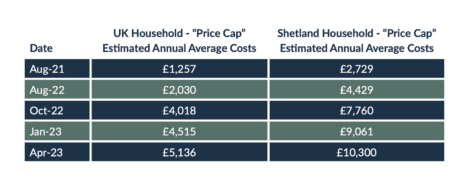Energy / Local fuel poverty rate could skyrocket to 96%, council analysis suggests
Average annual household energy bills could reach more than £10,000
NEW analysis suggests nearly all households in Shetland could technically be in fuel poverty come spring next year due to rising bills – prompting council leader Emma Macdonald to express her concern to the UK chancellor.
Shetland Islands Council estimates suggest 96 per cent of households could be in fuel poverty in April, with the average energy cost per household in Shetland potentially sitting at £10,300 – double that of the UK.
This is because the cost of heating homes in Shetland is greater than on the mainland, partly down to the climate but also the lack of availability of cheaper options like gas as well as varying levels of insulation.
Macdonald has written to the UK Government chancellor Nadhim Zahawi about the “stark” figures, which were compiled by council officers, adding that there needs to be “Shetland-proofed” assistance.
“It’s not something that we can tackle alone, and we do need immediate government support to do that,” she said.
Fuel poverty is when a household spends ten or more per cent of their household income on energy costs. Under the new analysis households would need to bring in £104,000 a year to avoid being in fuel poverty.
Previous estimates have suggested at least one third of local households are in fuel poverty.
It comes after energy regulator Ofgem announced last week it will increase the energy price cap by 80 per cent from October in response to increased wholesale costs.
But estimates of future annual energy costs bandied out in the media last week were UK averages and did not take into account regional differences.
The estimated total energy cost to Shetland households between October to March was more than £18 million, but this is predicted to be around £56 million for the upcoming winter.
Become a member of Shetland News
Council leader Emma Macdonald added there was a continued sense of irony that Shetland struggles with energy bills when current and future energy development is taking place on the isles’ doorstep, describing it as “incredibly unfair”.
The 103-turbine Viking Energy wind farm is being built in the central mainland – and offshore wind sites are set to be developed in the years ahead.
“Our islands have been at the heart of oil and gas activity for over forty years, yet our people have not seen the benefits of that in terms of a lower cost of fuel,” Macdonald said.
“Shetland has contributed, and will continue to contribute, significantly to UK energy exports, and yet people in our communities will struggle to heat their homes in the coming year.
“This is particularly ironic, given the continued development of offshore and onshore renewable energy production around Shetland.
“We are calling for UK government support to enable host communities to secure long-term community benefit arrangements, which could include access to low-cost energy for islanders.
“But we also need immediate government help to address rising energy costs, which will have such a damaging impact on those who live in Shetland.”
The leader said it was clear the government will have to come with some form of financial help – “but whatever they do come with, they need recognise that might not be enough here”.
“We know that our cost of living here is anything from 20 to 65 per cent higher already before this.”
The idea of a ‘Shetland tariff’ has been floated in recent years by local politicians keen to see the isles benefit from cheaper bills to compensate for energy developments in Shetland.
Last week it was announced that three sites to the east of Shetland have been picked for future offshore wind farms.
Back in January a report was presented to councillors which set out ‘developer principles’ for companies behind offshore wind sites around Shetland.
It said the council believes that £5,000 per installed megawatt – the same as onshore wind like Viking Energy – or [circa] 2.5 per cent of generation value would be an appropriate community benefit payment for offshore wind.
With the three sites to the east of the isles totalling up to 2.8GW, that potentially is worth £14 million a year to Shetland.
But there is an acknowledgment that energy supply could act as an alternative to flat cash when it comes to community benefits.
The ORION clean energy project, which counts the council as a partner, not only aims to generate greener energy but also facilitate affordable power.
Its project coordinator Gunther Newcombe said community benefits could take a number of forms, although it is obviously a longer-term issue.
“It’s not just cash, it could be investment in the community, investment in infrastructure, clean energy,” he said.
Newcombe added: “Oil and gas has been of huge benefit to the community in Shetland – nobody can deny that.
“But actually the product is bypassing Shetland – there’s no gas used from the Shetland Gas Plant on Shetland, there’s no oil used from Sullom Voe Terminal on Shetland – it’s not refined.
“Energy is an incredibly important component of any Shetland community, or any Shetland business…so if we can look at also one of the benefits to the community of being potentially a supply of energy at an affordable price.
“We’re looking at exploring all avenues, so none of this is set out in stone or decided, but it is definitely being discussed.”
Meanwhile the new fuel poverty statistics are set to reinforce the idea that some people may have to choose between “eating or heating” this winter.
Macdonald said there is naturally going to be a health impact for some of those who are unable to meet their bills.
“If you’re worrying about whether you can turn your heating on to keep your family warm, that’s bound to have an impact on people’s mental wellbeing as well as their physical health,” she said, “so it’s a whole package, and that’s why we do need action.”
Become a member of Shetland News
Shetland News is asking its many readers to consider paying for membership to get additional features and services: -
- Remove non-local ads;
- Bookmark posts to read later;
- Exclusive curated weekly newsletter;
- Hide membership messages;
- Comments open for discussion.
If you appreciate what we do and feel strongly about impartial local journalism, then please become a member of Shetland News by either making a single payment, or setting up a monthly, quarterly or yearly subscription.
















































































